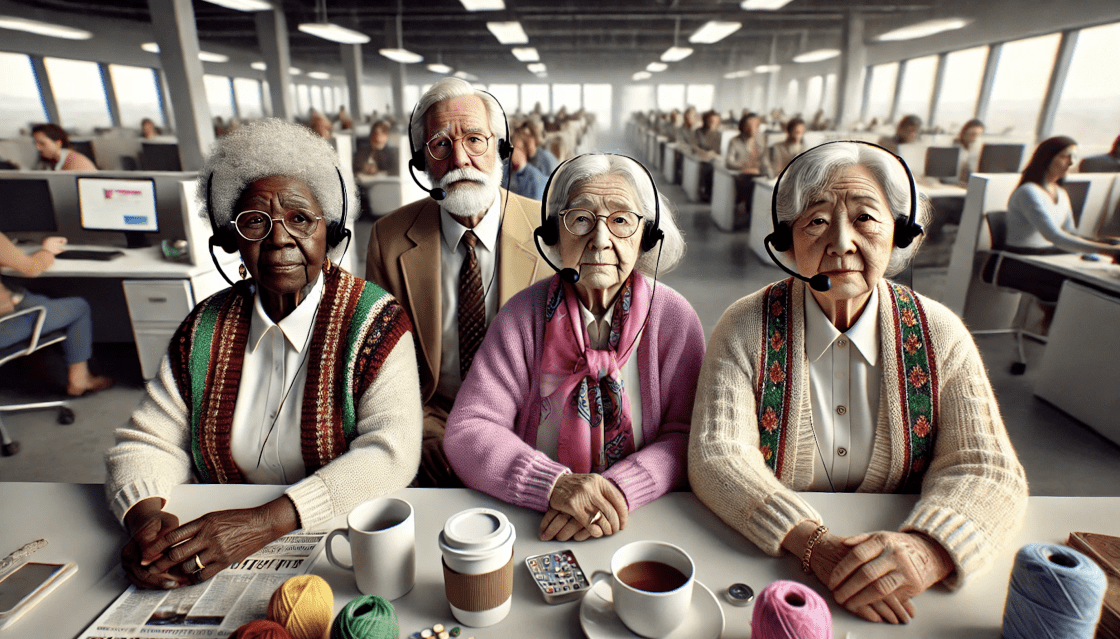In today’s fast-paced, technology-driven world, ageism remains a significant barrier that many older adults encounter, particularly when seeking employment. Ageism, which refers to discrimination based on a person’s age, often leads to unfair stereotypes about senior citizens’ abilities, especially in the workforce. These outdated views not only limit opportunities for seniors but also prevent society from benefiting from the wisdom, experience, and emotional intelligence that older adults possess. However, by reimagining customer service roles as a potential career path for seniors, supported by the latest AI tools, we can break these stereotypes and foster a more inclusive, connected society.
Understanding Ageism: A Societal Barrier
Ageism has deep historical roots, often stemming from a cultural focus on youthfulness and productivity. As a result, seniors are sometimes perceived as being out of touch or less capable, particularly when it comes to technology or fast-paced work environments. Media portrayals further fuel this misconception, presenting older adults as unable to keep up with modern demands. These stereotypes contribute to a world where many seniors find it increasingly difficult to secure employment, even when they are fully capable of performing the tasks required.
In the workforce, ageism manifests in various ways, such as fewer job opportunities, reduced salaries, or being overlooked for promotions. For older individuals who are still eager to contribute, whether for financial reasons or personal fulfillment, this exclusion can be devastating. Ageism not only harms seniors but also deprives businesses of a valuable, knowledgeable workforce that could enhance company culture and customer experience.
Customer Service as a Solution
One way to address ageism in the workplace is to open up customer service roles to seniors, giving them the opportunity to contribute meaningfully to their communities while benefiting businesses. Imagine calling a company for assistance and being greeted by a senior citizen from your local community, speaking with calmness, empathy, and understanding. This is the kind of experience that could transform customer service, making it more personal and human-centered.
Seniors, especially those with years of life experience, tend to excel in interpersonal skills such as patience, listening, and emotional intelligence. These are key qualities in customer service, particularly when dealing with stressed or frustrated customers. By placing senior citizens in customer-facing roles, businesses can create a more soothing and supportive experience for their clients, all while providing older adults with meaningful employment.
The Role of AI in Empowering Seniors
While some might argue that customer service roles require technical skills or quick responses, this is where artificial intelligence (AI) can come into play. Rather than replacing human workers, AI can serve as a valuable tool to support senior citizens in these roles. With AI-powered systems, seniors can quickly access customer information, troubleshoot problems, and manage administrative tasks efficiently—all through intuitive user interfaces and voice-activated systems.
By combining the natural strengths of older adults—such as empathy, communication, and patience—with AI-driven tools, seniors could handle complex inquiries and provide exceptional customer service. For instance, an AI interface could automatically pull up relevant information or suggest responses based on customer queries, leaving seniors free to focus on what they do best: connecting with people on a human level. This symbiosis between human warmth and machine precision creates a customer service experience that is both efficient and compassionate.
Shifting Cultural Perceptions of Aging
Culturally, we need to shift how we view older adults in the workplace. Instead of seeing seniors as being past their prime, we should recognize them as valuable community members with a wealth of experience to offer. Customer service roles provide a perfect opportunity for this shift, as these positions are people-centered and rely on skills that many older adults excel in. By positioning seniors in customer service roles—both locally and globally—we can integrate them into the workforce in ways that enhance their dignity and sense of purpose.
This shift would not only benefit seniors but would also help businesses stand out by offering a more personalized customer service experience. In a world where customer service is often marked by rushed interactions and scripted responses, a conversation with a caring, knowledgeable senior could provide a welcome change. This approach could improve customer satisfaction, build brand loyalty, and create a more inclusive business environment.
The Benefits of Age Diversity in the Workplace
Age diversity in the workplace has been shown to foster innovation, creativity, and problem-solving. By blending the strengths of older and younger employees, companies can create a more dynamic, balanced workforce. Seniors bring years of experience, unique perspectives, and emotional resilience—qualities that are particularly valuable in customer-facing roles.
Furthermore, employing seniors in customer service roles can help break down the stereotypes associated with aging. It demonstrates that older adults are fully capable of adapting to new technologies and excelling in modern work environments. Businesses that embrace this approach not only combat ageism but also position themselves as leaders in inclusivity and corporate responsibility.
A Win-Win for Businesses and Communities
Integrating seniors into customer service roles supported by AI offers a win-win solution for businesses and communities. For seniors, these roles provide an opportunity to stay active, contribute meaningfully, and connect with others, all while benefiting from the cognitive and social engagement that comes with employment. For businesses, senior customer service representatives can provide a more compassionate and personalized customer experience, which is especially valuable in an age where customer service often feels impersonal.
This approach also benefits society as a whole. By employing seniors in these roles, we foster greater intergenerational interaction, strengthen community ties, and create a more inclusive workforce. These benefits extend beyond the workplace, as seniors who feel valued and engaged are less likely to experience social isolation, leading to better mental and physical health outcomes.
Breaking the Barriers of Ageism
To move toward this vision, society must address the root causes of ageism through education and awareness. Businesses, governments, and communities all have a role to play in breaking down the stereotypes associated with aging. Governments can support this shift by offering training programs that help seniors develop new skills, particularly in using AI and other digital tools. Additionally, local businesses could be incentivized to hire senior citizens through tax breaks or subsidies, further encouraging the integration of older adults into the workforce.
By highlighting the benefits of hiring seniors, particularly in customer service roles, we can start to change perceptions about aging. It’s important to recognize that seniors are just as capable of learning and adapting as younger generations, and with the right support, they can thrive in modern work environments.
A Path Toward Inclusivity
The fight against ageism requires a cultural and structural shift, and one of the most effective ways to initiate this change is through meaningful employment opportunities for senior citizens. By positioning seniors in customer service roles, we can combat ageism, break down harmful stereotypes, and create a more inclusive society. Supported by AI, seniors can excel in these roles, contributing to businesses and communities in ways that enhance customer satisfaction and foster greater human connection.
As we continue to embrace technology, it’s important to remember that the future of work should include individuals of all ages. By recognizing the value that seniors bring to customer service roles, we can build a more inclusive, compassionate society where everyone, regardless of age, feels valued and empowered to contribute. This new approach not only uplifts seniors but also enriches businesses and communities, creating a win-win scenario for all.


